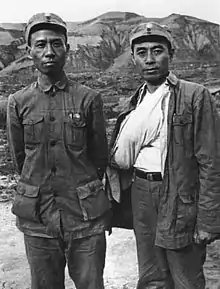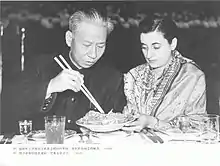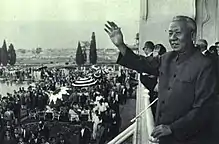Liu Shaoqi
Liu Shaoqi (pronounced [ljǒu ʂâutɕʰǐ]; 24 November 1898 – 12 November 1969) was a Chinese revolutionary, politician, and theorist. He was Chairman of the NPC Standing Committee from 1954 to 1959, First Vice Chairman of the Communist Party of China from 1956 to 1966 and Chairman of the People's Republic of China, the de jure head of state, from 1959 to 1968, during which he implemented policies of economic reconstruction in China.
Liu Shaoqi | |
|---|---|
刘少奇 | |
 | |
| Chairman of the People's Republic of China | |
| In office 27 April 1959 – 31 October 1968 | |
| Premier | Zhou Enlai |
| Vice President | Dong Biwu and Soong Ching-ling |
| Leader | Mao Zedong (Chairman of the Communist Party of China) |
| Preceded by | Mao Zedong |
| Succeeded by | Dong Biwu and Soong Ching-ling (acting) |
| Chairman of the Standing Committee of the National People's Congress | |
| In office September 15, 1954 – April 28, 1959 | |
| Preceded by | Position established |
| Succeeded by | Zhu De |
| First Vice Chairman of the Communist Party of China | |
| In office 28 September 1956 – 1 August 1966 | |
| Chairman | Mao Zedong |
| Preceded by | Position established |
| Succeeded by | Lin Biao |
| Member of the National People's Congress | |
| In office 15 September 1954 – 21 October 1968 | |
| Constituency | Beijing At-large |
| Personal details | |
| Born | 24 November 1898 Ningxiang, Hunan, Qing Empire |
| Died | 12 November 1969 (aged 70) Kaifeng, Henan, People’s Republic of China |
| Nationality | Chinese |
| Political party | Communist Party of China (1921–1968) |
| Spouse(s) |
|
| Children | Liu Yunbin Liu Aiqin Liu Yunruo Liu Tao Liu Ding Liu Pingping Liu Yuan Liu Tingting Liu Xiaoxiao |
| Liu Shaoqi | |||||||||||||
|---|---|---|---|---|---|---|---|---|---|---|---|---|---|
| Simplified Chinese | 刘少奇 | ||||||||||||
| Traditional Chinese | 劉少奇 | ||||||||||||
| |||||||||||||
For 15 years, Liu was the third most powerful man in China, behind only Chairman Mao Zedong and Premier Zhou Enlai. Originally groomed as Mao's successor, Liu antagonized him in the early 1960s before the Cultural Revolution. From 1966 onward, Liu was criticized and then purged by Mao. In 1968, Liu disappeared from public life and was labelled the "commander of China's bourgeoisie headquarters", China's foremost "capitalist-roader", and a traitor to the revolution.
He died under harsh treatment during the Cultural Revolution, but was posthumously rehabilitated by Deng Xiaoping's government in 1980 and granted a national memorial service.
Biography
Youth
Liu was born into a moderately rich peasant family in Huaminglou village,[1] Ningxiang, Hunan province;[2] his ancestral hometown is located at Jishui County, Jiangxi. He attended Ningxiang Zhusheng Middle School (Chinese: 寧鄉駐省中學; pinyin: Nìngxiāng Zhùshěng zhōngxué), and was recommended to attend a class in Shanghai to prepare for studying in Russia. In 1920, he and Ren Bishi joined a Socialist Youth Corps; the next year, Liu was recruited to study at the Comintern's University of the Toilers of the East in Moscow.[1]
He joined the newly formed Communist Party of China (CPC) in 1921. The next year he returned to China, and as secretary of the All-China Labor Syndicate led several railway workers' strikes, in the Yangzi Valley and at Anyuan on the Jiangxi-Hunan border.[1]
Early political activities
In 1925, Liu became a member of the Guangzhou-based All-China Federation of Labor Executive Committee. During the next two years he led numerous political campaigns and strikes in Hubei and Shanghai. He worked with Li Lisan in Shanghai in 1925, organizing Communist activity following the May Thirtieth Incident. After his work in Shanghai, Liu traveled to Wuhan. He was briefly arrested in Changsha and then returned to Guangzhou to help organize the 16-month-long Canton-Hong Kong strike.[3]
He was elected to the Party's Central Committee in 1927, and was appointed to the head of its Labor Department.[4] Liu returned to work at the Party headquarters in Shanghai in 1929, and was named Secretary of the Manchurian Party Committee in Fengtian.[5] In 1930 and 1931, he attended the Third and Fourth Plenums of the Sixth Central Committee, and was elected to the Central Executive Committee (i.e., Politburo) of the Chinese Soviet Republic in 1931 or 1932. Later in 1932, he left Shanghai and traveled to the Jiangxi Soviet.[6]
Senior leader
Liu became the Party Secretary of Fujian Province in 1932. He accompanied the Long March in 1934 at least as far as the crucial Zunyi Conference, but was then sent to the so-called "White Areas" (areas controlled by the Kuomintang) to reorganize underground activities in northern China, centered around Beijing and Tianjin. He became Party Secretary in North China in 1936, leading the anti-Japanese movements in that area with the assistance of Peng Zhen, An Ziwen, Bo Yibo, Ke Qingshi, Liu Lantao, and Yao Yilin. Liu ran the Central Plains Bureau in 1939; and, in 1941, the Central China Bureau. Some Japanese sources have alleged that the activities of his organization sparked the Marco Polo Bridge Incident in July 1937, which gave Japan the excuse to launch the Second Sino-Japanese War.[7]
In 1937, Liu traveled to the Communist base at Yanan; in 1941, he became a political commissar of the New Fourth Army.[7] He was elected as one of five CPC Secretaries at the Seventh National Party Congress in 1945. After that Congress, he became the supreme leader of all Communist forces in Manchuria and northern China,[7] a stature frequently overlooked by historians.
Liu became the Vice Chairman of the Central People's Government in 1949. In 1954, China adopted a new constitution at the first National People's Congress (NPC); at the Congress's first session, he was elected chairman of the Congress's Standing Committee, a position he held until the second NPC in 1959. From 1956 until his downfall in 1966, he ranked as the First Vice Chairman of the Communist Party of China.[7]
Liu's work focused on party organizational and theoretical affairs.[8] He was an orthodox Soviet-style Communist, and favored state planning and the development of heavy industry. He elaborated upon his political and economic beliefs in his writings. His best known works include How to be a Good Communist (1939), On the Party (1945), and Internationalism and Nationalism (1952).
State Chairman
Liu spoke very strongly in favour of the Great Leap Forward at the Eighth CPC National Congress in May 1958.[9] At this Congress Liu stood together with Deng Xiaoping and Peng Zhen in support of Mao's policies against those who were more critical, such as Chen Yun and Zhou Enlai.
As a result, Liu gained influence within the party. In April 1959, he succeeded Mao as Chairman of the People's Republic of China. However, Liu began to voice indications of concern about the outcomes of the Great Leap in the August 1959 Lushan Plenum.[9] In order to correct the mistakes of the Great Leap Forward, Liu and Deng led economic reforms that bolstered their prestige among the party apparatus and the national populace. The economic policies of Deng and Liu were notable for being more moderate than Mao's radical ideas.
Conflict with Mao

Liu was publicly acknowledged as Mao's chosen successor in 1961;[1] however, by 1962 his opposition to Mao's policies had led Mao to mistrust him.[10] After Mao succeeded in restoring his prestige during the 1960s,[11] Liu's eventual downfall became "inevitable". Liu's position as the second-most powerful leader of the CPC contributed to Mao's rivalry with him at least as much as Liu's political beliefs or factional allegiances in the 1960s,[10] especially during and after the Seven Thousand Cadres Conference, indicating that Liu's later persecution was the result of a power struggle that went beyond the goals and well-being of either China or the Party.


By 1966, few senior leaders in China questioned the need for a widespread reform to combat the growing problems of corruption and bureaucratisation within the Party and the government. With the goal of reforming the government to be more efficient and true to the Communist ideal, Liu himself chaired the enlarged Politburo meeting that officially began the Cultural Revolution. However, Liu and his political allies quickly lost control of the Cultural Revolution soon after it was called, when Mao used the movement to progressively monopolize political power and to destroy his perceived enemies.[12]
Whatever its other causes, the Cultural Revolution, declared in 1966, was overtly pro-Maoist, and gave Mao the power and influence to purge the Party of his political enemies at the highest levels of government. Along with closing China's schools and universities, and Mao's exhortations to young Chinese to randomly destroy old buildings, temples, and art, and to attack their teachers, school administrators, party leaders, and parents,[13] the Cultural Revolution also increased Mao's prestige so much that entire villages adopted the practice of offering prayers to Mao before every meal.[14]
In both national politics and Chinese popular culture, Mao established himself as a demigod accountable to no one, purging any that he suspected of opposing him[15] and directing the masses and Red Guards "to destroy virtually all state and party institutions".[12] After the Cultural Revolution was announced, most of the most senior members of the CPC who had voiced any hesitation in following Mao's direction, including Liu Shaoqi and Deng Xiaoping, were removed from their posts almost immediately; and, with their families, subjected to mass criticism and humiliation.[13]
Liu and Deng, along with many others, were denounced as "capitalist roaders". Liu was labeled as a "traitor" and "the biggest capitalist roader in the Party"; he was displaced as Party Deputy Chairman by Lin Biao in July 1966. By 1967, Liu and his wife Wang Guangmei were placed under house arrest in Beijing. Liu was removed from all his positions and expelled from the Party in October 1968. After his arrest, Liu disappeared from public view.
Vilification, death and rehabilitation
Liu was beaten regularly at public denunciation meetings by the Red Guards after his arrest in 1967. He was denied medicine for his diabetes, by then a long-term illness, and for pneumonia, which he developed after his arrest. Liu was eventually given treatment only when Jiang Qing feared he would die; she desired that Liu be kept alive to serve as a "living target" during the Ninth Party Congress in 1969.
At the Congress, Liu was denounced as a traitor and an enemy agent. Zhou Enlai read the Party verdict that Liu was "a criminal traitor, enemy agent and scab in the service of the imperialists, modern revisionists and the Kuomintang reactionaries". Liu's conditions did not improve after he was denounced in the Congress, and he died soon afterward.[16][17]
In a memoir written by Liu's principal physician, he disputed the alleged medical maltreatment of Liu during his last days. According to Dr. Gu Qihua, there was a dedicated medical team in charge of treating Liu's illness; between July 1968 and October 1969, Liu had seven total occurrences of pneumonia due to his deteriorating immune system, and there had been a total of 40 group consultations by top medical professionals regarding the treatment of this disease. Liu was closely monitored daily by the medical team, and they made the best effort given the adverse circumstance. He died from complications due to diabetes on November 12, 1969, and was cremated the next day.[18]
In February 1980, two years after Deng Xiaoping came to power, the Fifth Plenum of the 11th Central Committee of the Communist Party of China issued the "Resolution on the Rehabilitation of Comrade Liu Shaoqi". The resolution fully rehabilitated Liu, declaring his ouster to be unjust and removing the labels of "renegade, traitor and scab" that had been attached to him at the time of his death. It also declared him to be "a great Marxist and proletarian revolutionary" and recognized him as one of the principal leaders of the Party. Lin Biao was blamed for "concocting false evidence" against Liu, and for working with the Gang of Four to subject him to "political frame-up and physical persecution". A high-profile national memorial ceremony was held for Liu on May 17, 1980, and his ashes were scattered into the sea at Qingdao in accordance with his last wishes.[19][20]
On November 23, 2018, Chinese Communist Party's general secretary Xi Jinping delivered a speech in the Great Hall of the People in Beijing to commemorate the 120th anniversary of the birth of Liu Shaoqi.[21]
Personal life
Liu married five times, including to He Baozhen (何宝珍)[22] and Wang Guangmei (王光美).[23] His third wife, Xie Fei (谢飞), came from Wenchang, Hainan and was one of the few women on the 1934 Long March.[24] His wife at the time of his death in 1969, Wang Guangmei, was thrown into prison by Mao Zedong during the Cultural Revolution; she was subjected to harsh conditions in solitary confinement for more than a decade.[25]
Works
- Liu Shaoqi (1984). Selected Works of Liu Shaoqi. I (1st ed.). Beijing: Foreign Languages Press. ISBN 0-8351-1180-6.
- — (1991). Selected Works of Liu Shaoqi. II (1st ed.). Beijing: Foreign Languages Press. ISBN 0-8351-2452-5.
References
Citations
- Dittmer, Lowell, Liu Shao-ch’i and the Chinese Cultural Revolution: The Politics of Mass Criticism, University of California Press (Berkeley), 1974, p. 27
- Snow, Edgar, Red Star Over China, Random House (New York), 1938. Citation is from the Grove Press 1973 edition, p.482-484
- Dittmer, p. 14
- Chen, Jerome. Mao and the Chinese Revolution, (London), 1965, p. 148
- Dittmer, p. 15
- Snow, p. 482-484
- Dittmer 1974, p. 17 citing Tetsuya Kataoka, Resistance and Revolution in China: The Communists and the Second United Front, 1974 pre-publication.
- Dittmer 1974, p. 206
- Dittmer 1974, p. 39–40
- Qiu Jin, The Culture of Power: the Lin Biao Incident in the Cultural Revolution, Stanford University Press: Stanford, California. 1999, p.53
- Spence, Jonathan D. The Search for Modern China, New York: W.W. Norton and Company. 1999. ISBN 0-393-97351-4 p.566.
- Qiu Jin, The Culture of Power: the Lin Biao Incident in the Cultural Revolution, Stanford University Press: Stanford, California. 1999, p.45
- Spence, Jonathan D. The Search for Modern China, New York: W.W. Norton and Company. 1999. ISBN 0-393-97351-4 p.575.
- Spence, Jonathan D. The Search for Modern China, New York: W.W. Norton and Company. 1999. ISBN 0-393-97351-4 p.584
- Barnouin, Barbara and Yu Changgen. Zhou Enlai: A Political Life. Hong Kong: Chinese University of Hong Kong, 2006. ISBN 962-996-280-2 p.4
- Chung, Jang. White Swans: Three Daughters of China. Touchstone: New York, NY. 2003. p.391. ISBN 0-7432-4698-5.
- Glover, Jonathan (1999). Humanity : A Moral History of the Twentieth Century. London: J. Cape. p. 289. ISBN 0-300-08700-4.
- 回忆抢救刘少奇, 炎黄春秋 [Liu Shaoqi's Emergency Treatment] (in Chinese). Sina.com History. 2013-11-12.
- "Rehabilitation of Liu Shaoqi (Feb. 1980)". Retrieved November 22, 2011.
- Liu Shaoqi at Encyclopædia Britannica
- "Xi's speech commemorating 120th anniversary of Liu Shaoqi's birth published". People's Daily. December 4, 2018. Retrieved December 4, 2018.
- 刘少奇婚姻家庭 (in Chinese). Archived from the original on March 17, 2012. Retrieved January 29, 2011.
- 前国家主席刘少奇夫人王光美访谈录 (in Chinese). Sina.com. Retrieved January 29, 2011.
- 长征时与刘少奇结伉俪,琼籍女红军传奇人生 (in Chinese). Retrieved January 29, 2011.
- Lieberthal, Kenneth. Governing China: From Revolution to Reform. w.w.Norton, New York 1995.
Sources
- "Fifth Plenary Session of 11th C.C.P. Central Committee", Beijing Review, No. 10 (10 March 1980), pp. 3–10, which describes the official rehabilitation measures.
External links
| Assembly seats | ||
|---|---|---|
| New title | Chairman of the Standing Committee of the National People's Congress 1954–1959 |
Succeeded by Zhu De |
| Political offices | ||
| Preceded by Mao Zedong |
Chairman of the People's Republic of China 1959–1968 |
Succeeded by Dong Biwu and Soong Ching-ling (acting) |
| Party political offices | ||
| Preceded by Mao Zedong |
President of the CPC Central Party School 1947–1953 |
Succeeded by Kai Feng |
| New title | Vice Chairman of the Communist Party of China Served alongside: Zhou Enlai, Zhu De, Chen Yun, Lin Biao 1956–1966 |
Succeeded by Lin Biao |
